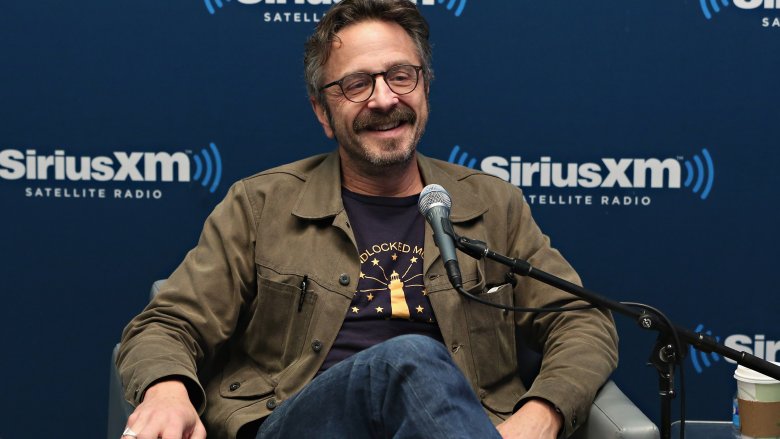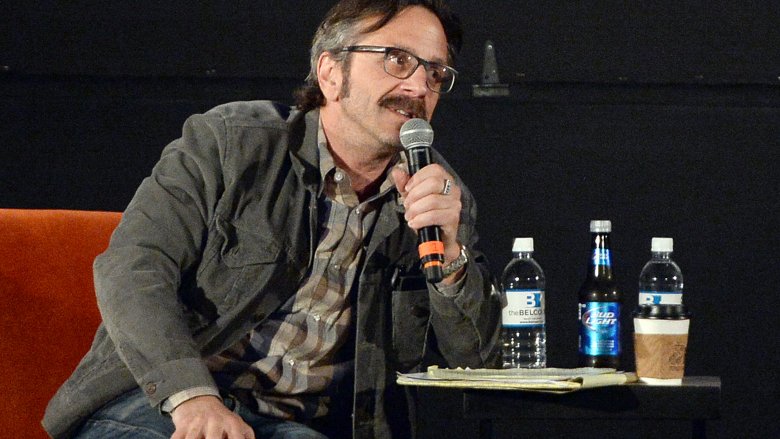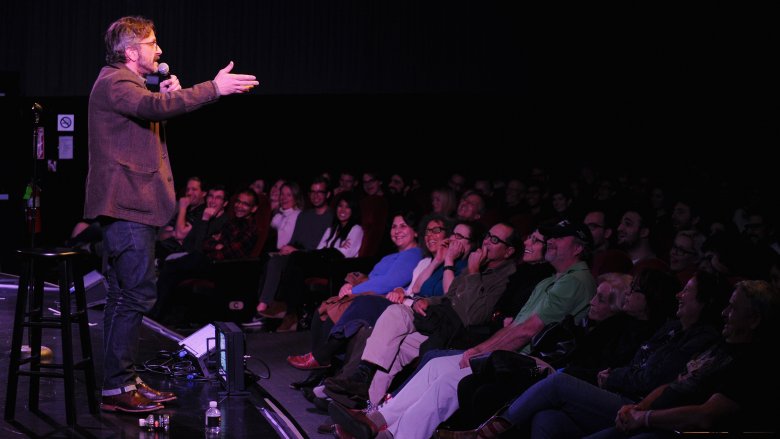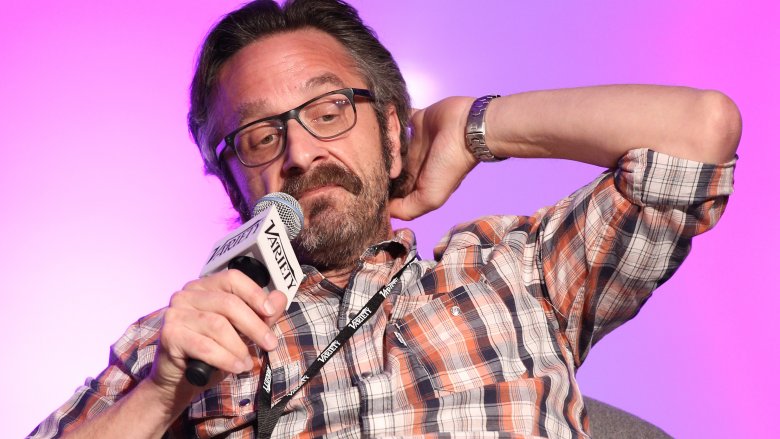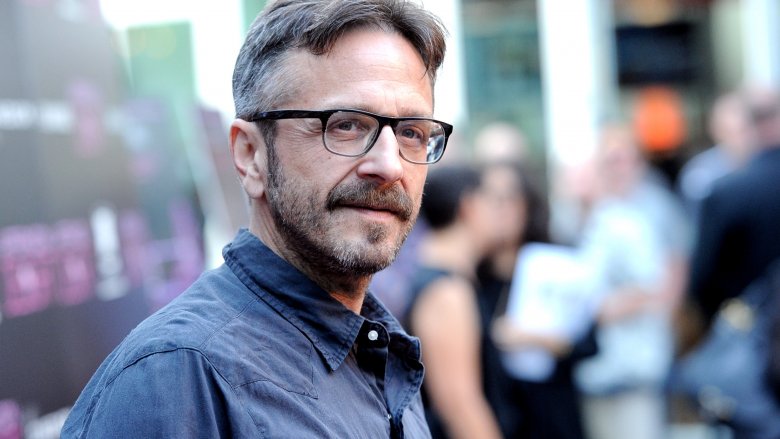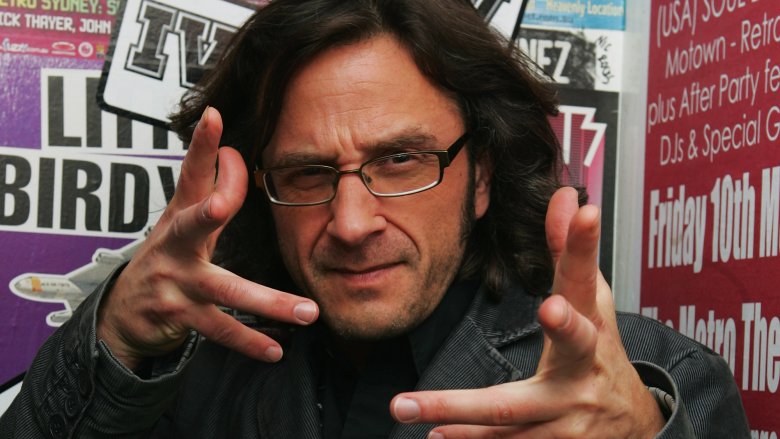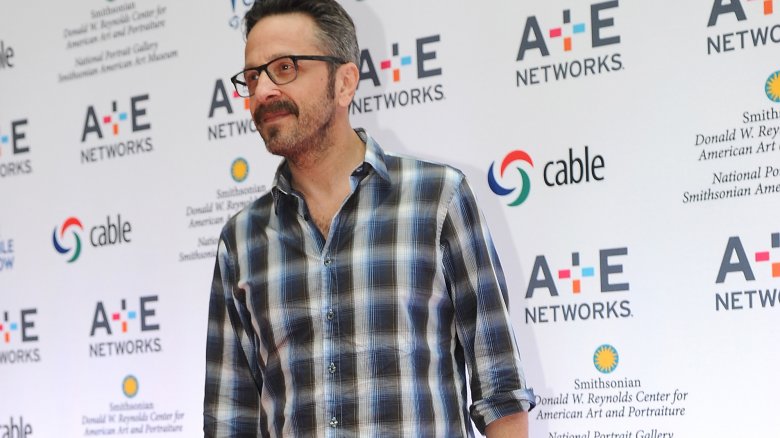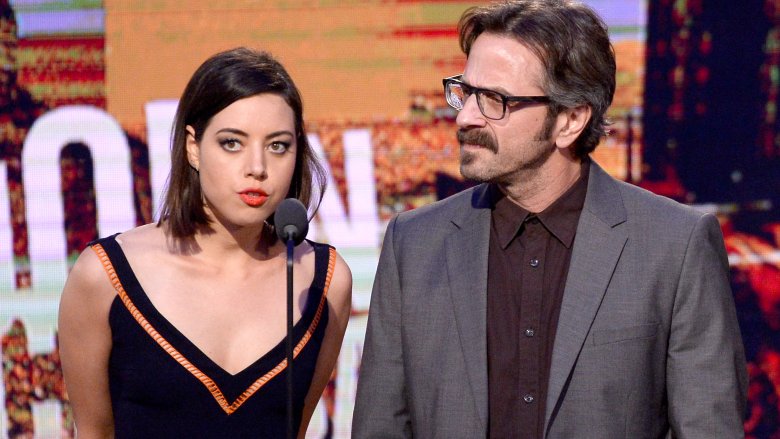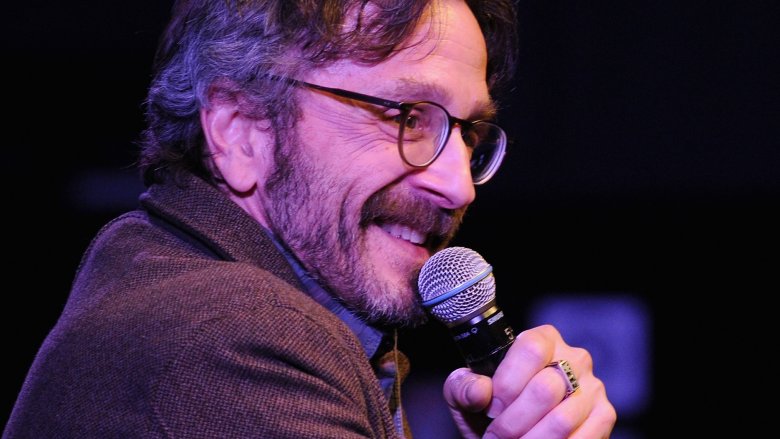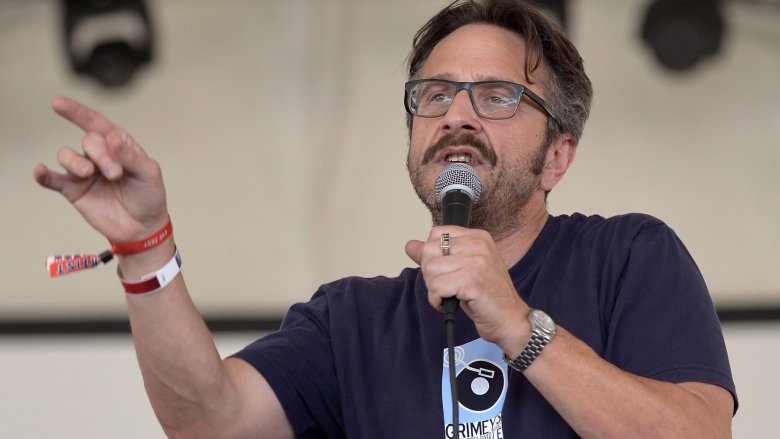The Untold Truth Of Marc Maron
We may receive a commission on purchases made from links.
Marc Maron is the famously candid, famously open comedian and conversationalist behind WTF, and after hundreds of podcasts, his listeners know him as not just the guy who can get some incredible interviews, but as the guy who has shared a ton about his own struggles with addiction. Think you know everything there is to know about him? Probably not ... even if you haven't missed an episode.
Hanging out at a hardware store made him a good listener
Listen to WTF, and you might think Maron is interviewing his guests. According to what he told the Columbia Journalism Review, that's not what's going on at all. He says he doesn't even like to call himself an interviewer because there's no interview happening. He's having a conversation with the guests who stop by his house, and that's what makes something special happen.
Listening — and conversing — is an entirely different skill set, and it's one not too many people have in the "me-me-me" culture of today's modern world. Maron does his share of talking, too, but when it comes to listening, he credits his grandfather with helping him hone those skills from a young age. "My grandfather had a hardware store in Haskell, New Jersey, you know, when I was a kid," he told NPR. "And there used to be this crew of three or four old dudes and I was just sort of fascinated with it. You're just sitting there talking to these guys."
And then, he started talking to everyone. More than that, he says that's how he learned to listen and to quickly form an emotional connection with someone, all thanks to a group of guys who probably had no idea how much of an influence they were being.
His first regular job in comedy was as a doorman
Stand-up comedy is one of those things you have to be born to do, right? Well, not really. Maron told Rolling Stone he absolutely hated his first few forays into the stand-up world. He did a few open mic nights while he was going to college in Boston, and even though he absolutely hated the experience, he still felt like he should get into comedy. He picked up and moved to Los Angeles, a move that, according to what he told The Standard, turned into the most unlikely experience.
His contemporaries were heavyweights like Sam Kinison and Andrew Dice Clay, but Maron? He was working the door. He said he headed out there in the summer of 1986 and knew club owner Mitzi Shore after getting hired on as a PA in one of her productions. She gave him a job on the door of The Comedy Store. For him, "Being a doorman at The Store was a sort of rite of passage. That means you were there, and that you could find your way on stage."
He said it was his foot in the door and the wall beyond it, too. At the same time it was a bit of a wake-up call as to what the scene was really about, it also sucked him into that world completely and totally, for better and worse.
His parents have struggled with their own issues
Regular WTF listeners have probably noticed how fixated Maron can be about guests' younger years, and a large part of that obsession stems from his own strange childhood. Maron isn't the only one in his family to acknowledge the impact it's had, and his brother, Craig, told The Washington Post that being happy doesn't come naturally to a Maron.
Maron's father, Barry, was described as a brilliant surgeon who also suffered from severe narcissistic tendencies and bipolar disorder, tendencies that show up when Maron recounts his graduation day from Boston University. It was the same day his father announced he didn't want to live, then promptly ran off. (He came back not long after.) Maron told NPR that he was so desperate for his father's attention that he became a hypochondriac, just to be at the center of things for even a little bit.
He's discussed his mother, too, calling her "a functioning anorexic" who took offense when he once wrote she weighed 119 pounds instead of her true 116. He was an adult when she sat him down to tell him, "Look, Marc, I got to be honest with you: I don't know if I could love you if you were fat," but that still had to sting. He said she's also told him that when he was younger, she didn't know if she'd be able to love him at all. That's a pretty big piece of the puzzle surrounding his own issues.
He's has some strong feelings about traditional rehab and therapy
Maron has been incredibly open about his struggles with addiction and the time he's spent getting professional help, and when he sat down with psychiatry resident physician Arjune Rama (via Slate), he was just as open about what he thought was wrong with the way psychiatry is approached.
Maron asked if Rama had ever read The Big Book, which forms the cornerstone of Alcoholics Anonymous. Rama said no, and Maron says that's one of the biggest problems in the world of modern therapy. "Yeah, see, that's the thing with all you guys. Most therapists have never read that f**king book. But you send people to AA meetings ... but you have no understanding of what the program is."
That disconnect, he says, is the problem. Where Rama's "conventional mental health care system" failed, Maron says programs like AA work by creating a community that puts everyone on a level playing field — the same thing he's trying to do in his work. When Rama asked Maron what he wanted to say to the official system, he responded, "I would tell them to think about addiction the same way I tell alcoholics: 'You're going to die from this. Nobody survives this. One way or another, it's going to kill you.'"
He counts Todd Hanson among his best interviews
Todd Hanson was the head writer at The Onion, and when he first appeared on WTF, they were sitting in the same hotel he had attempted suicide in. Not surprisingly, the two-part podcast resonated with a lot of people, and when Slate asked Maron what his favorite podcasts were of the hundreds he's done, he called Hanson's a "monumental episode." He added that he'd known Hanson for a while but never imagined their conversation was going to be as powerful as it ended up being.
Hanson hadn't wanted to talk about his suicide attempt at first, leaving Maron to put the possibility on the table for whenever he was ready. That happened on the second show, and Maron said it took him about a month to get to the point where he wanted to guide listeners through they day he'd tried to kill himself. "It was a life-changing conversation," Maron said. "And the reaction to that conversation, from people who either lost people to suicide and could not understand why or how someone could do that, or people who tried suicide before, of people who struggled with those feelings — the outpouring of reaction to that conversation was profound."
His rivalry with Jon Stewart is pure jealousy
The entertainment world is full of feuds, and one of the strangest might be the long-standing bitterness boiling between Maron and Jon Stewart. They've both been pretty quiet about just what happened to cause such enmity, but Maron said a little about the issue in 2012 when he spoke with Rolling Stone. The only thing behind it? Jealousy.
"He was my f**kin' enemy," Maron said. "Because I thought I could be him. We're both middle-class Jews, my family's from Jersey, I'm a smart guy, too. ... He'd be on TV, on the cover of magazines and s**t, I'd be walking down the street and see his f**king mug, always smirking. ... In my mind, I was a rebel, and he was just a f**kin' phony."
The bitterness is so real it's almost a tangible thing, but Maron said he's tried to reach out in hopes of mending fences. He called Stewart's office and Stewart returned his call personally, but said there's no chance he'd be going on WTF. According to Stewart, there was no anger there, but there definitely wasn't any love, and after a vague sort of offer to have coffee sometime, no one ever followed through. Maron does admit the whole thing opened his eyes, saying, "He put me in my place."
He thinks men and women should be spoken to differently
Maron was talking to The New York Times in 2017 when they called him out on a trend a lot of people had commented on: his tendency to treat male and female guests differently. The subject came up after he mentioned Anne Hathaway as one of his favorite guests and called himself "a defender of her honor." When he was asked if it was true he treated men and women differently on purpose, he responded with, "Yeah, of course I do. Is that a problem?"
The Times pointed out that yes, actually, there are a lot of people who would think it's a problem, because aren't all guests supposed to be treated equally? Maron was completely unfazed, and said the idea didn't really apply to him because "I'm not in journalism. I'm just a guy with a lot of flaws."
His fictional counterpart relapsed because he wanted the reminder
His real life is obviously a huge part of the character he plays on his IFC show, Maron, so when his fictional counterpart descended into a whole lot of trouble, that left viewers wondering just what was going on. When the fictional Maron relapsed on pain medication and continued down the dark road of addiction, Fast Company asked the real Maron why he'd decided to go that way with his character.
"It's exploring the worst possible outcome," Maron told them. "Somebody like me who's got 16 years sober, I've seen guys go out after 20 years, and it's horrendous, and this is usually how it happens. ... Making this season is a safe way for me to explore the horror of that possibility and do it comedically."
Maron also talked to NPR's Terry Gross about his character's relapse, adding it's something he's personally terrified of for himself. He's spent his whole life functioning on the default settings of "uncomfortable" and "anxious," and it's always in the back of his mind. Mostly, he says, because it's not that far-fetched.
He's not sure about God, but he's prayed plenty
Maron definitely isn't alone in his desire to reconcile his feelings on whether God is real, and for someone who's struggling with addiction, there's an incredibly important part of the 12-step recovery program that says believing in a higher power and drawing strength from that belief is important.
When Terry Gross asked him (via NPR) what his higher power is, he said he's "very vague about a sense of God actively in my life." He was quick to point out that a higher power is defined as whatever works for the individual, and anything can fill that void. Humor worked for him as a higher power, and he noted he didn't necessarily have a defined relationship with any form of god but was more than happy to admit it wasn't in him. At the same time, the act of praying became incredibly important to him.
"You know, it was recommended that you get on your knees and pray to something," he said. "And I did that because that act of — I found that the act of humbling yourself — there was something very emotional about the act of praying. Whether or not I believed or not didn't seem to really matter."
There are some things he'll hold back
Maron's famously open and honest when it comes to his own life and his own struggles, but it turns out there are some things that he just doesn't talk about anymore. The Washington Post reported that when he started dating Sarah Cain, he made it a point to keep conversation about her to a minimum. It was the first relationship he hadn't spoke openly about. When you factor in his previous relationships that ended badly, he may be learning his lesson on oversharing.
In 2016, he revealed to The Guardian that he was in a place he could turn down interviews he didn't really want to do, and that he also was recognizing the benefits of leaving some things unsaid. He was still sharing when it came to himself, but his relationships with others were getting more and more off the table. "I've learned that out of respect for other people, there are some things you don't need to talk about," he said. "I don't need to throw someone under the bus or reveal things about my relationship with somebody." He said it's a valuable lesson he's learned, although he thinks he's still about 80 percent of a completely open book.
